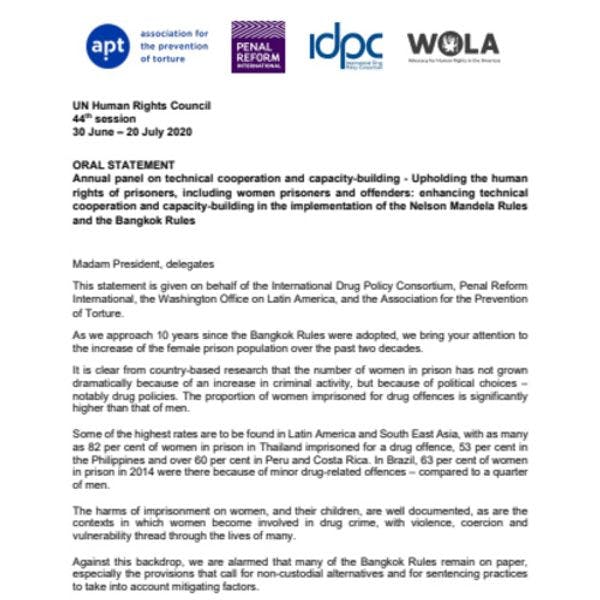Oral statement at the 44th session of the Human Rights Council - Thematic panel discussion on technical cooperation and capacity-building
UN Human Rights Council
44th session
30 June – 20 July 2020
ORAL STATEMENT
Annual panel on technical cooperation and capacity-building - Upholding the human rights of prisoners, including women prisoners and offenders: enhancing technical cooperation and capacity-building in the implementation of the Nelson Mandela Rules and the Bangkok Rules
Madam President, delegates
This statement is given on behalf of the International Drug Policy Consortium, Penal Reform International, the Washington Office on Latin America, and the Association for the Prevention of Torture.
As we approach 10 years since the Bangkok Rules were adopted, we bring your attention to the increase of the female prison population over the past two decades.
It is clear from country-based research that the number of women in prison has not grown dramatically because of an increase in criminal activity, but because of political choices – notably drug policies. The proportion of women imprisoned for drug offences is significantly higher than that of men.
Some of the highest rates are to be found in Latin America and South East Asia, with as many as 82 per cent of women in prison in Thailand imprisoned for a drug offence, 53 per cent in the Philippines and over 60 per cent in Peru and Costa Rica. In Brazil, 63 per cent of women in prison in 2014 were there because of minor drug related offences – compared to a quarter of men.
The harms of imprisonment on women, and their children, are well documented, as are the contexts in which women become involved in drug crime, with violence, coercion and vulnerability thread through the lives of many.
Against this backdrop, we are alarmed that many of the Bangkok Rules remain on paper, especially the provisions that call for non-custodial alternatives and for sentencing practices to take into account mitigating factors.
Swift and bold reform is needed to turn the tide on women’s imprisonment. We call on the Human Rights Council and its mechanisms to pay greater attention to the harm and violations suffered by women who come into contact with criminal justice systems – including by building on the work to-date to address human rights violations associated with drug policies.
Association for the Prevention of Torture
International Drug Policy Consortium
Penal Reform International
Washington Office for Latin America
Downloads
Topics
Regions
Related Profiles
- International Drug Policy Consortium (IDPC)
- Penal Reform International
- Washington Office on Latin America (WOLA)
